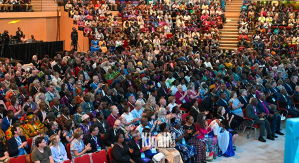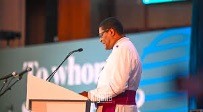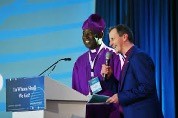The Church of England’s abandonment of biblical authority demonstrates captivity to secular culture; re-setting of the Anglican Communion now an urgent priority, says the Kigali Commitment
"See to it that no one takes you captive through hollow and deceptive philosophy, which depends on human tradition and the elemental spiritual forces of this world rather than on Christ.
For in Christ all the fullness of the Deity lives in bodily form, and in Christ you have been brought to fullness. He is the head over every power and authority." Colossians 2:8-10
Of the 1300 delegates attending the wonderful fourth Global Anglican Future Conference in Kigali, Rwanda, from 17-21 April, 125 were from the Great Britain and Europe region. The majority of these were from the Church of England, “compelled to resist” changes in doctrine and ethics from within the historic denomination. A significant number also attended from the Anglican Network in Europe, while the presence and unique voice of individuals from the Church in Wales and the Free Church of England were also appreciated. There was a mix of those who had attended previous global Gafcon gatherings, and those for whom the experience was a first.

The ’twin track’ approach
Different perspectives on the extent of the problems in the Church of England, different views on what to do about it, and even varied opinions about Gafcon itself have in recent times led to quite sharp disagreements between these different groups. But being together as part of a much bigger gathering, strengthened by the essential hundreds of informal conversations (not possible via Zoom) with one another and with folk from the wider church, showed the underlying unity of all those faithful to the bible
Gafcon delegates committed to remaining in the Church of England and those who have left or are considering leaving, agree that the work of the church in offering worship to God and making disciples of Jesus is only meaningful and effective if we share the same understandings of faith and basic worldview. They agree that seeing ourselves as part of a global fellowship is essential rather than a luxury, and that if those entrusted with leadership through history, geography and tradition can no longer be trusted to guard the faith, this global fellowship must take the lead.
These factors are the basis of Gafcon Great Britain and Europe which brings together faithful Anglicans in our region from the ‘twin tracks’ of inside and outside the Canterbury structures, united by commitment to the authority of Scripture and being inspired by the vision and leadership of Gafcon. The way this leadership functions for people in our branch is different: for members of ANiE convocations, Gafcon provides formal oversight and recognition, while for faithful Anglicans in the C of E and Church in Wales there can be informal support. However Gafcon is increasingly seen by those from all groups as a genuine spiritual home, especially given the strong commitment to working closely with GSFA in the coming months and years.
The Kigali Commitment
There have been many reports on Gafcon (see selection in News). Readers are encouraged to discover more of what happened at the conference and how key leaders responded, as background to the Kigali Commitment. This document, with its powerful re-statement of the supremacy of Christ, the authority of his word, and the necessity of our response – “to whom shall we go?” – will hopefully be seen as an important contribution to the history of Christian mission. Many delegates are sharing this with their churches in various creative ways, as a basis for discussion and prayer on how to move forward.

Nigeria’s Archbishop Ndukuba reads the Kigali Commitment
What kind of church are we?
“Our Chairman [Archbishop Foley Beach] in his opening address encouraged us to be a repenting church, a reconciling church, a reproducing church and a relentlessly compassionate church. This is the church we want to be.” (From The Kigali Commitment, opening paragraph). The Kigali conference also showed the kind of church that already exists among faithful Anglicans across the world:
A diverse, yet united church
The vibrant mix of different races and backgrounds at Gafcon can’t be overstated. Bishops from affluent churches in the US rubbed shoulders with Mothers Union members from rural Tanzania; businessmen from Zimbabwe prayed with clergy from Pakistan. Translation was going on to assist Anglicans from Chile (Spanish), Brazil (Portuguese) and Congo (French). Worship styles and intercessions ranged from the formal and liturgical to the Pentecostal. Each delegate had an individual story to tell of God’s faithfulness in their lives, based on the same understanding of the gospel which united us. Contrast this with the experience many have of Anglicanism in Britain: monochrome in culture, but divided in theology.
An episcopal, yet biblically faithful church
Purple shirts and at times, coloured stoles and even headgear looking as if it had been invented in 15thcentury Italy were in evidence at the conference, causing difficulty for low church brethren for whom such trappings are inherently unsound. But from the mouths of these bishops came affirmation of biblical truth and denunciations of theological error which might be seen as a bit strong for the polite Canadians and English!

Lee McMunn (AMiE) interviews Uganda’s Archbishop Kaziimba before he preaches on Colossians 4, on the Friday of the Kigali conference
A realistic, yet visionary church
Unlike the last Lambeth Conference, where leaders pretended that all is well, this meeting went to the heart of the problem. First, sin inherent in all of us, from which we all need to repent. Then, identifying the problem in Western Anglicanism not just in a recent decision of Church of England General Synod about same sex relationships, but more than 25 years of capitulating to secular ideologies in culture and revisionist theology in church. In response to this, the vision of Gafcon is neither to minimise differences in the search for “good disagreement”, nor to merely cling on to pockets of orthodoxy in an unstable structure, but to separate from heterodox versions of Anglicanism, and re-establish the church on right foundations, for the evangelisation of the nations.
A prophetic, yet pastoral church
Bible believing Christians in the West have often been intimidated into silence, afraid to speak God’s clear word on what we should believe and how we should behave, because of fear of being called “unloving”. But the bible never sets pastoral care for struggling individuals and prophetic declaration of truth against each other. The Kigali Commitment combines both approaches, declaring that those who continue to promote serious error have forfeited their leadership position in the Communion, while at the same time promising to “support and care for one another in a loving and pastorally sensitive way as members of Christ’s body, building one another up in the Word and in the Spirit, and encouraging each other to experience God’s transforming power…”
A re-set, yet unchanged church.
Gafcon is not advocating the formation of a new church, but a re-formed and renewed Anglicanism. This will need a combination of enterprise, innovation, perseverance and constant commitment to unity and fellowship in the face of inevitable bumps on the road to changed structures and ways of working together. But it will be based on looking to the One who is unchanging, and to his word which remains constant.
Please re-read our April Editorial, written before the Kigali conference, suggesting five hoped-for outcomes. Were these fulfilled?